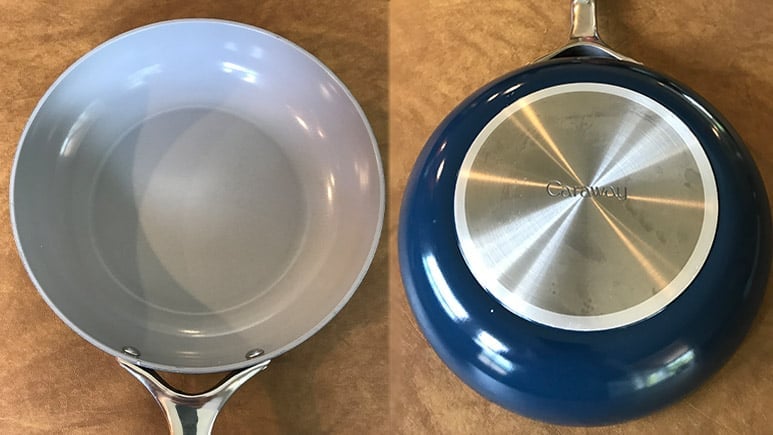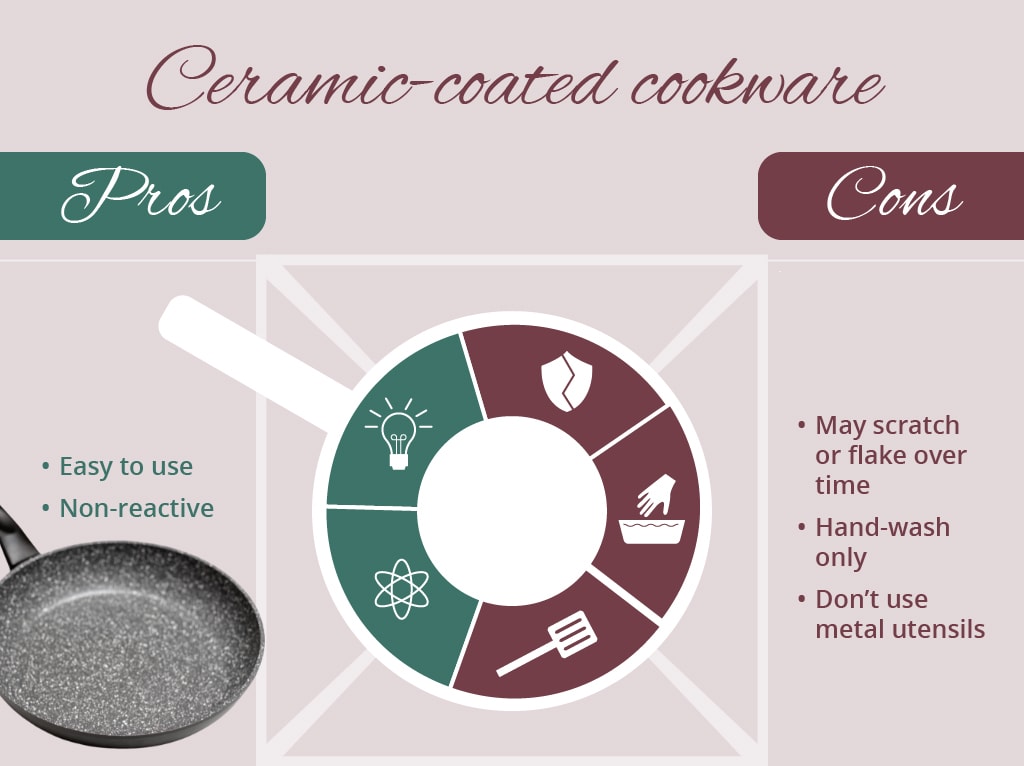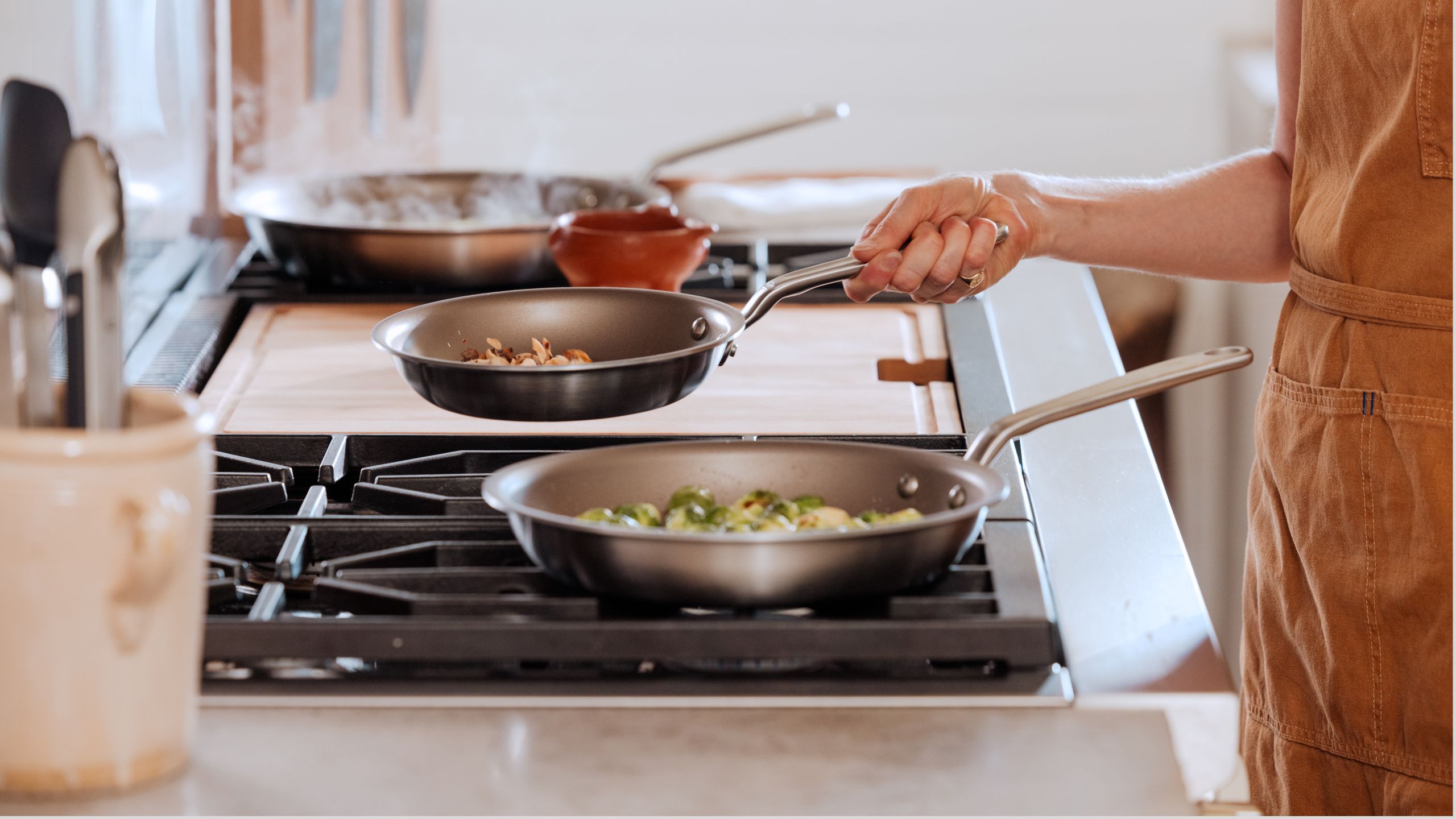If you’re considering investing in new cookware, ceramic options are worth exploring. With their sleek design and non-stick properties, ceramic pots and pans have gained popularity in recent years. However, before making a decision, it’s important to be aware of the pros and cons associated with using ceramic cookware. In this article, we’ll take a closer look at the benefits and drawbacks of these kitchen essentials, helping you make an informed choice that suits your cooking needs.
Some suggestions to consider!
CAROTE Pots and Pans Set Non Stick, 5pcs Cookware Sets, Dishwasher/Oven/Fridge Safe, Kitchen Set, Space Saving Pots Set, Nonstick Set with Versatile Detachable Handle, Induction RV Set
100% Off $87.61 (as of July 18, 2025 13:12 GMT +00:00 - More infoProduct prices and availability are accurate as of the date/time indicated and are subject to change. Any price and availability information displayed on [relevant Amazon Site(s), as applicable] at the time of purchase will apply to the purchase of this product.)CAROTE 21pcs Pots and Pans Set, Nonstick Cookware Set Detachable Handle, Induction Kitchen Cookware Sets Non Stick with Removable Handle, RV Cookware Set, Gold and Purple
25% OffCAROTE 3pcs Pots and Pans Set Non Stick, Cookware Sets, Kitchen Set, Oven/Dishwasher/Fridge Safe, Space Saving Pots Set, Nonstick Set with Versatile Detachable Handle, Induction RV Set, Black
$149.99 (as of July 18, 2025 13:12 GMT +00:00 - More infoProduct prices and availability are accurate as of the date/time indicated and are subject to change. Any price and availability information displayed on [relevant Amazon Site(s), as applicable] at the time of purchase will apply to the purchase of this product.)

Pros of Using Ceramic Cookware
Non-reactive and non-toxic
Ceramic cookware is known for being non-reactive and non-toxic. Unlike some other materials like copper or aluminum cookware, ceramic does not leach chemicals into your food during the cooking process. This makes it a safe choice for those who are concerned about potential harmful substances in their meals. Additionally, ceramic cookware is safe for individuals with metal allergies, as it does not contain any metals that could trigger an allergic reaction. Furthermore, ceramic cookware does not affect the flavors of your food, allowing you to enjoy the natural tastes of your ingredients.
Easy to clean
One of the major advantages of ceramic cookware is its ease of cleaning. The non-stick surface of ceramic pans simplifies the cleaning process significantly. Food and residue are less likely to stick to the smooth surface, making it easier to wipe clean or rinse off. This saves you time and effort compared to scrubbing away stubborn food particles from other types of cookware. Additionally, ceramic cookware is resistant to stains and odors, ensuring that the cookware stays looking and smelling fresh. Many ceramic pans are also dishwasher-safe, offering you the convenience of effortless cleaning.
Excellent heat distribution
Ceramic cookware excels in heat distribution. Its high thermal conductivity allows for uniform heating throughout the entire cooking surface, preventing hot spots that could lead to unevenly cooked food. This ensures that your dishes are cooked consistently and to perfection. The ability of ceramic to retain heat well is another advantage, as it helps to keep your food warm even after you’ve turned off the stove. This feature is particularly useful for serving food at the right temperature during dinner parties or gatherings.
Versatility in cooking
One of the great benefits of ceramic cookware is its versatility in the kitchen. Ceramic pans can be used on various stovetops, including gas, electric, and even induction cooktops. This allows you to use your ceramic cookware regardless of the type of stove you have. In addition to stovetop use, ceramic cookware is also safe to use in ovens and microwaves. This versatility opens up a wide range of cooking possibilities, from stovetop searing to oven baking and microwave reheating. Ceramic cookware is also ideal for different cooking techniques such as sautéing, frying, simmering, and boiling, making it a versatile and valuable addition to any kitchen.
Attractive appearance
Another advantage of ceramic cookware is its attractive appearance. With its sleek and modern design, ceramic cookware adds a touch of elegance to your kitchen. It is available in a wide range of colors, allowing you to choose cookware that matches your kitchen decor or personal style. The visual appeal of ceramic cookware enhances the overall look of your kitchen, making it a great choice if you value both functionality and aesthetics.
Cons of Using Ceramic Cookware
Fragility
While ceramic cookware offers numerous benefits, it does have its drawbacks. One of the major drawbacks is its fragility. Ceramic cookware is more prone to cracking or chipping if mishandled. Dropping a ceramic pan or subjecting it to sudden temperature changes can cause it to break or become damaged. To avoid this, it is important to handle ceramic cookware with care and store it properly. Keep in mind that rough handling or stacking heavy items on top of ceramic cookware can increase the risk of damage.
Limited durability
Ceramic cookware may have limited durability compared to some other types of cookware. Over time, the performance and appearance of ceramic pans can degrade. The non-stick properties may diminish, and the surface may become more prone to scratching. While ceramic cookware is generally sturdy and long-lasting with proper care, it may not withstand higher impacts or rough use as well as materials like stainless steel or cast iron.
Not suitable for high heat cooking
Another disadvantage of ceramic cookware is that it is not suitable for high heat cooking. Exposing ceramic pans to excessively high temperatures can cause them to warp or even crack. This limits the use of ceramic cookware for certain cooking methods that require extremely high heat, such as searing or stir-frying. It is important to follow the manufacturer’s recommendations regarding heat limits to ensure the longevity of your ceramic cookware and avoid the risk of damage.
Requires special care
Ceramic cookware requires special care to maintain its quality and longevity. First, it is important to avoid using metal utensils on ceramic pans, as they can scratch the surface. Instead, opt for wooden or silicone utensils that are gentle on the ceramic coating. Additionally, ceramic cookware should be hand-washed instead of being placed in the dishwasher. The harsh detergents and high temperatures in the dishwasher can potentially damage the ceramic surface. Taking the time to hand-wash your ceramic cookware will help ensure that it remains in good condition for years to come.
May contain trace amounts of heavy metals
While ceramic cookware is generally considered safe, it is worth noting that some ceramic glazes may contain trace amounts of heavy metals, such as lead or cadmium. The presence of these heavy metals largely depends on the quality of the glaze used by the manufacturer. To minimize any potential risks, it is recommended to purchase ceramic cookware from reputable brands that prioritize safety and quality control. Reading product labels or researching the manufacturer’s practices can provide valuable information about the safety of the ceramic cookware you are considering.
In conclusion, ceramic cookware offers many advantages that make it a popular choice for cooking enthusiasts. Its non-reactive and non-toxic nature ensures food safety, while its easy-to-clean surface and excellent heat distribution provide convenience and consistent results. The versatility of ceramic cookware allows for various cooking techniques and compatibility with different stovetops and oven use. With its attractive appearance, ceramic cookware can also add a touch of style to any kitchen. However, it is important to be mindful of the fragility and limited durability of ceramic cookware, as well as its susceptibility to high heat and its need for special care. By understanding the pros and cons, you can make an informed decision about whether ceramic cookware is the right choice for you and your culinary needs.

















